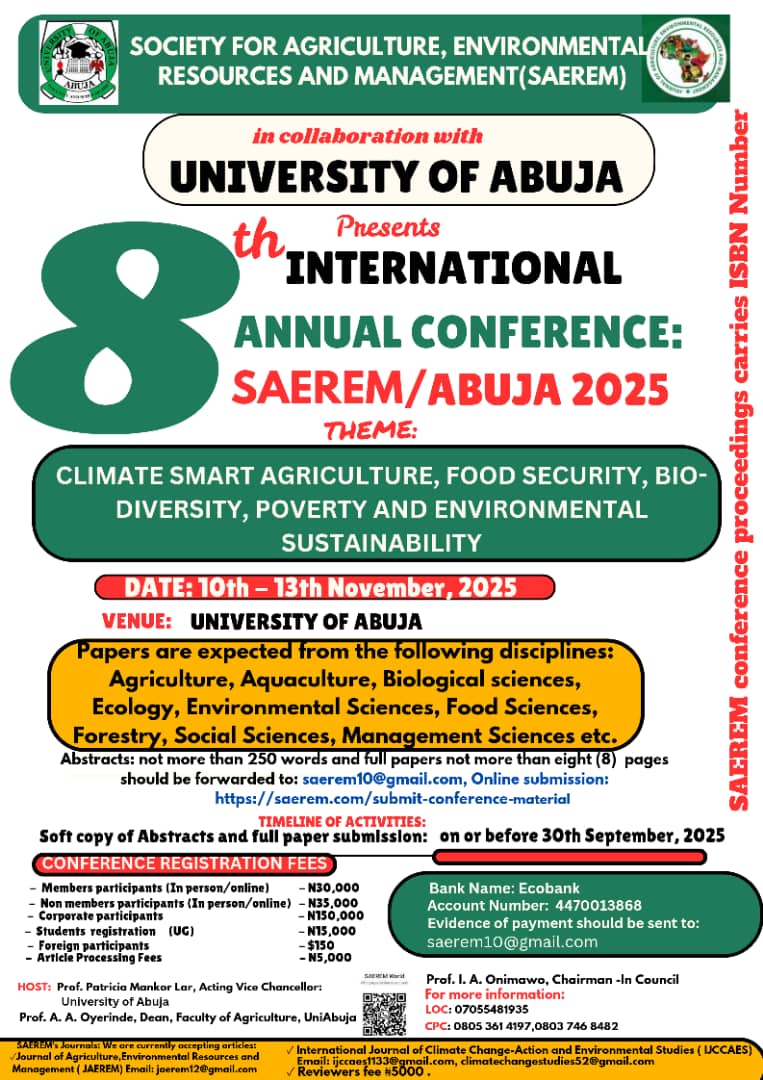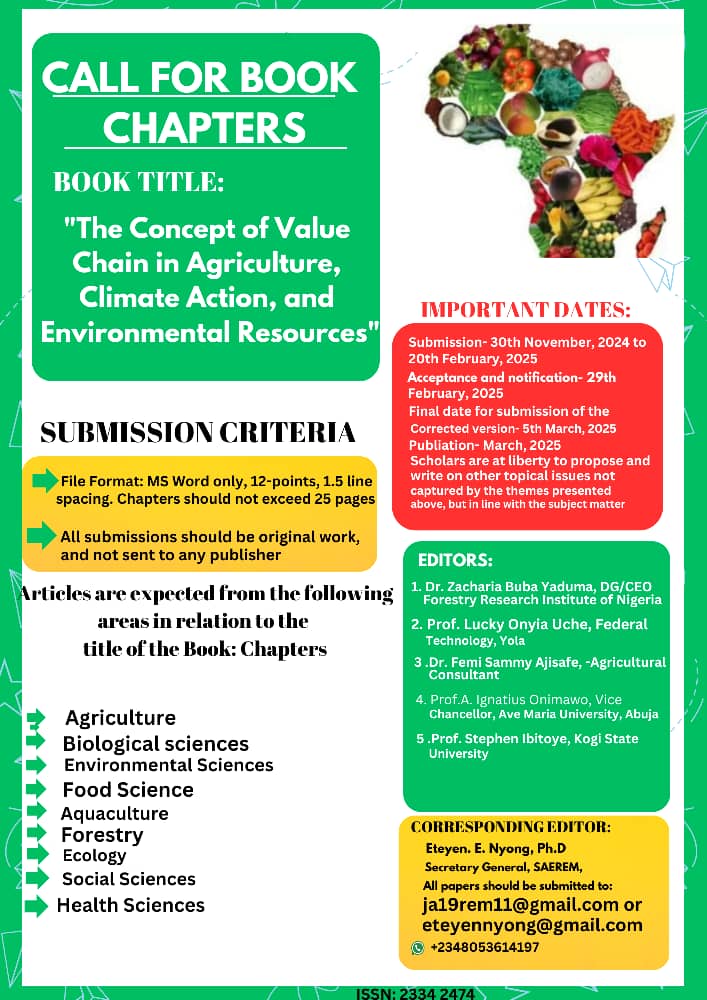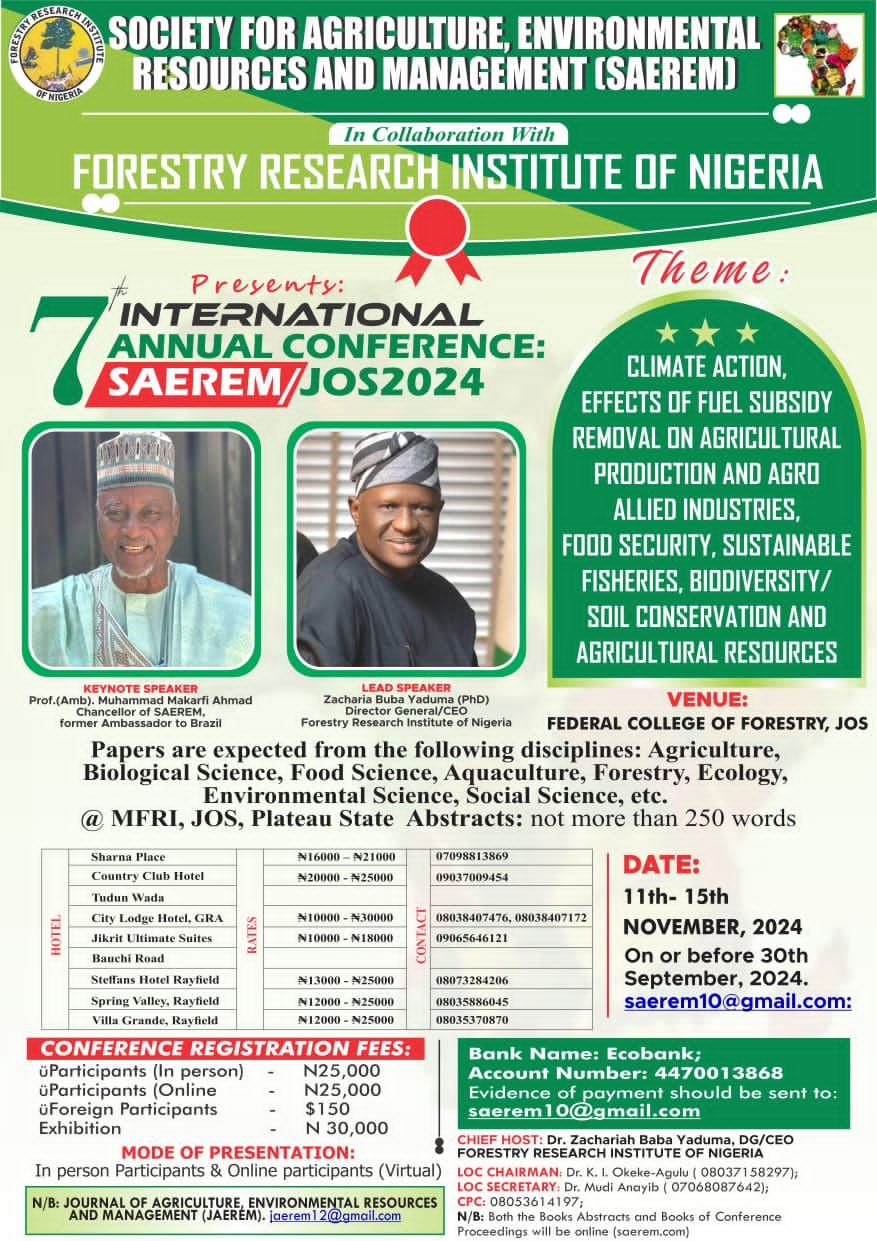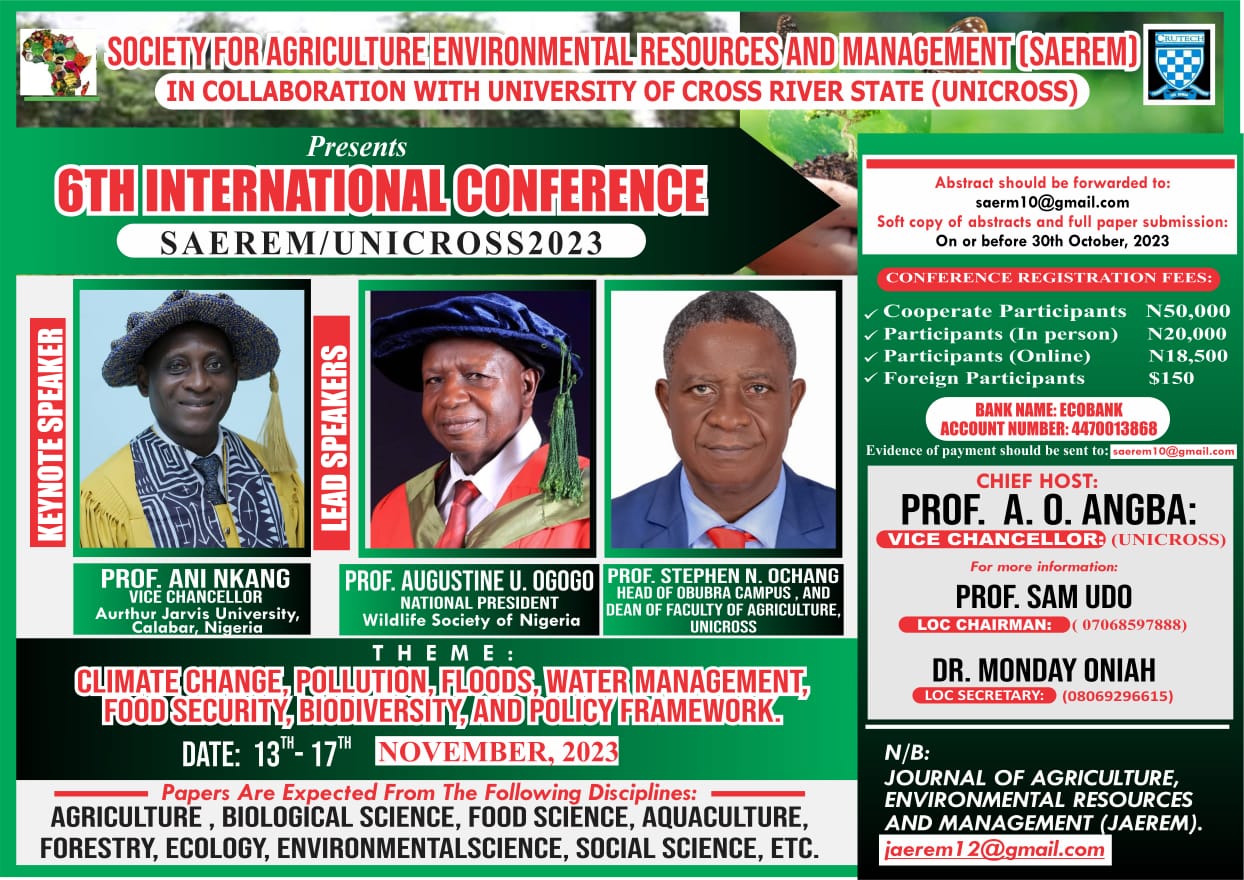
The Society of Agriculture, Environmental Resources and Management (SAEREM), is an interdisciplinary research based organization. Its scope encompasses the academia and the end user of research & development. Our areas of research cover all aspect of agriculture, environmental related sciences, resource economics, biological sciences, social sciences and management sciences. The organization gives research grant to researchers on climate change and related studies, and offers scholarship to undergraduate/post graduate students mostly from Nigeria.
Multidisciplinary research is a research technique in which tools from different sciences and disciplines are used to find an explanation for the question being studied. Multidisciplinary research is needed to solve many, if not all, of the major research challenges of the next decade. This cooperative and coordinated research requires the unified effort of experts from different disciplines. They all pool their knowledge to solve a problem(s) at hand.
In other words, this discipline involves the search for truth using many specialized branches of learning that aim to achieve a common goal using knowledge from other disciplines. Multidisciplinary research is an investigation or investigation of a problem to test the hypothesis combining many approaches, fields, or academic methods. Moreover, it can be defined as a knowledge search by an objective and systematic method for an original contribution to the existing stock of knowledge involving a combination of several disciplines and methods. Multidisciplinary studies address current and real problems, with a prioritized focus on solving them.
The multidisciplinary approach is very widespread in developing countries to solve the problem. It represents a progressive scholarly method. The multidisciplinary approach signifies that knowledge of several disciplines is used for a given problem and complements each other in such a way that it is possible to draw clear conclusions without being characterized as isolated or partial. When it comes to multidisciplinary research, a variety of disciplines are engaged in a certain line of inquiry that is specific to a problem or region. But the individual results of the disciplines concerned are only brought together in an aggregate. Modern research, therefore, tends to be frequently multidisciplinary in nature. The highly anticipated SAEREM Conference – 2025 will delve deeper into how and why multidisciplinary research is all the rage right now.





Prof. Anderson Chidi Amadioha, The Editorial Chairman,SAEREM
Prof. Amadioha, Anderson Chidi (FNIE) a professor at Michael Okpara University of Agriculture, Umudike Abia State. He was born on 5th July, 1960; at Iho-Dimeze. He is from Ikeduru local government area in Imo state, Nigeria. He is married with children.
Prof. Amadioha obtained his first school living certificate at Aguata High School, Aguata (1971 – 1976). He attended Holy Ghost College, Owerri (1976-1978) where he obtained his GCE/AL -4Papers. He proceeded to University of Ife (OAU), Ile –Ife. (1980 – 1983) where he obtained his B.sc,(Hon.Botany) in July,1983.He obtained M.Sc,(Plant Pathology) In Sept., 1985 at University of Ibadan, Ibadan.He further moved to University of Port-Harcourt, Port-Harcourt (1986 – 1987) to obtain a PGDE in September,1987. And in Feb., 1994 Prof. Amadioha bagged his Ph. D in Plant Pathology, at University of Ibadan, Ibadan. Prof. Amadioha belongs to several professional and reputable bodies. He has been a reviewer of several international journals of repute. He has over 54 journal publications and 10 conference proceedings both locally and internationally.He authored three books.

Prof. STEPHEN J. IBITOYE , FSAEREM CHAIRMAN-IN-COUNCIL
Stephen Jimoh IBITOYE is a Professor of Farm Management and Production Economics. Prof. Ibitoye attended LGEA Primary School, Ijowa- Isanlu and also a 1975 graduate of St. Kizito’s College, Isanlu both in Kogi State, Nigeria. He holds BSc. in Agricultural Economics from the University of Ibadan (1982), PGDE from University of Jos (1985), MSc. in Agricultural Economics from University of Ilorin (1992) and PhD in Farm Management and Production Economics from University of Nigeria, Nsukka (2006). Prof Ibitoye completed his NYSC at Bauchi State Investment and Property Development Authority from 1982 to 1983. He worked as a Lecturer at College of Education, Azare, in Bauchi State, College of Education, Oro, Kwara State, Kogi State College of Education, Ankpa and as Planning, Monitoring and Evaluation Officer at Kogi State Agricultural Development Project, Lokoja. He is currently a Professor of Farm Management and Production Economics at Prince Abubakar Audu University, Anyigba, Kogi State, Nigeria. Prof Ibitoye has International reputation for his expertise in global Agricultural Economy. He has contributed to a number of funded research studies. He has participated as a Consultant and Trainer in many Impact Assessment Studies.
Prof Ibitoye has many publications to his credit comprising of Textbooks, Monographs, Journal Articles, Conference Proceedings and Technical Reports. His research findings have been published widely with over 70 high quality peer reviewed journal and conference publications. He has also reviewed over 50 manuscripts for both National and International journals. He is Fellows of the Institute of Corporate Administration (FCAI) and Society of Agriculture, Environmental Resource and Management (FSAEREM) and member of many International and National professional bodies. He is one of the Patrons of the Kogi Diocese of The African Church. .
LEAD SPEAKERS –SAEREM,UNICROSS 2023

Résumé of Prof. Ani Nkang – Vice Chancellor, Arthur Jarvis University, Calabar, Nigeria.
Prof Ani Nkang graduated with B. Sc (Hons.) from the University of Nigeria, Nsukka in 1977. On completion of his national service, he proceeded to Australia as the recipient of the Commonwealth Scholarship and Fellowship Plan (CSFP) award to the University of Queensland, ST. Lucia from where he obtained a PhD degree, with specialization in Rainforest Seed Biology, in 1986. He joined the services of the University of Calabar as Lecturer II in 1986 and was promoted to the rank of Professor of Plant and Ecological Studies in 2003. He has served at various times as departmental Head and Dean of Faculty of Science in the University of Calabar. Prof. Nkang is a Fellow of the Nigeria Environmental Society and has served as Chairman/member of several Panel Review Teams on environmental impact assessment (EIA) of projects for the Federal Ministry of Environment, Nigeria and Chairman/member of several accreditation panels for the National Universities Commission (NUC).
Prof. Nkang’s research interests focus on oxidative stress in seeds and plants and conservation of biodiversity, especially of the rainforest biome. In the course of his work he has attracted several research grants including those of the International Foundation for Science (IFS), the Tertiary Education Trust Fund (TETFUND) and Raw Materials Research Development Council (RMRDC) of Nigeria. Prof. Nkang has successfully supervised and co-supervised at least fourteen PhD and several M. Sc candidates. He has published over 75 peer-reviewed papers and 80 technical environmental reports in the focal area of biodiversity. He has also edited/co-edited several books. His wealth of experience led to his appointment in 2012 as a Consultant to the World Bank on Biodiversity/Sustainable Forestry focal area for the Nigeria Erosion and Watershed Management Project (NEWMAP).

Prof. AUGUSTINE. U. OGOGO
National President: Wildlife Society of Nigeria.
Visiting Scholar, Department of Biology, Ignatius Ajuru University of Education, Port Harcourt, Nigeria E-MAIL: daka.erema@ust.edu.ng EDUCATIONAL INSTITUTIONS & QUALIFICATIONS -Rivers State University of Science and Technology, Port Harcourt -B.Sc. Applied Biology (Zoology Option), First Class Hons (1985); M.Phil. Marine Biology (1991) University of Liverpool, United Kingdom -Ph. D. Marine Biology –Ecotoxicology (1996)

Prof. Stephen. N. Ochang
Head of Obubra Campus, and Dean of Faculty of Agriculture, UNICROSS
Prof. Stephen Ncha Ochang is an erudite Scholar, Researcher & Professor of Aquaculture. He is a Fish Nutritionist with several publications in reputable journals in the area of Fish Nutrition. He holds B.Sc Hons. degree in Zoology (Ibadan), M.Sc in Fisheries and Aquaculture (Calabar); and a PhD in Fisheries Aquaculture, (FUTA) in 2007.
Prof. Ochang has occupied several Administrative & other positions at various times, including:
*Head of Department, Fisheries & Aquatic Science – (2011 – 2013)
*Chairman, Academic Staff Union of Universities, Cross River University of Technology (ASUU-CRUTECH) Chapter, (2014-2016),
*University Orator, Cross River University of Technology Calabar, (2016- Date).
*Dean of Faculty & Head of Campus, Faculty of Management Sciences, Ogoja Campus (2019-2020),
*Member, Cross River University of Technology Governing Council (2019- date).
*Dean of Faculty & Head of Campus, Faculty of Agriculture and Forestry, Obubra Campus (2021-Date).He was licensed for ministerial service in 1999 and ordained a minister of the gospel of Jesus Christ in 2002. He is currently the Asst Pastor of Cathedral of Destiny, Calabar, the State Headquarters Church of the Charismatic Renewals Ministries (CRM)
Recent Publications
ROFESSOR THANKGOD PETER OJIMBA, FSAEREM:
INAUGURAL LECTURE
CRUDE OIL POLLUTION, CROP PRODUCTION, AND FARMERS’ WELFARE IN RIVERS STATE, NIGERIA. AN INAUGURAL LECTURE BY PROFESSOR THANKGOD PETER OJIMBAM.Sc (Tashkent, USSR), M.Phil (UI), Ph.D (UI) Professor of Agricultural Production and Environmental Economics INAUGURAL LECTURE SERIES NO. 47 27TH JULY, 2023
IGNATIUS AJURU UNIVERSITY OF EDUCATION, RUMUOLUMENI, PORT HARCOURT, RIVERS STATE.
1.0 INTRODUCTION
1.1 Background Information
The Niger Delta region of Nigeria is one of the world’s largest wetlands and includes by far the largest mangrove forest in Africa. Its biological diversity is of global significance. Within the extremely valuable ecosystem, oil activities are widespread (Niger Delta Development Commission, 2006): At the same time an expanding poor rural and urban population makes most resource and land – use decisions in the region. These are driven by a lack of development, poor health, stagnant agricultural productivity, and limited opportunities in urban areas, rapid population and tenuous property rights. Conflicts between local communities, and private and public developers over ownership and use of resources, particularly tied to oil activities, are increasing and have resulted in outbreaks of violence (Isumonah, 1998; Onuoha, 2004).
Prof. Samuel Ohikhena AGELE, phd.
COMMUNIQUE ISSUED AT THE END OF A 3-DAY NATIONAL CONFERENCE OF THE SOCIETY FOR AGRICULTURE, ENVIRONMENTAL RESOURCES AND MANAGEMENT (SAEREM) HOSTED VIRTUALLY BY UNIVERSITY OF CALABAR, ON 18TH -20TH NOVEMBER, 2020; (UNICAL2020)
INTRODUCTION
The Society for Agriculture, Environmental Resources and Management (SAEREM), a multi-disciplinary organisation of academics as well as industry and health sector practitioners across the 36 States of Nigeria, held a 3-day virtual Conference hosted by University of Calabar, on 18th-20th November, 2020. The theme of the Conference was: Capitalism and Climate Change Impact on Food Production and Environmental Resources. Its aim was to explore issues of Climate Change and its effect on agriculture and the environment with a view to finding adaptation and mitigation measures. Issues of sustainability of agribusiness as well as the current COVID-19 pandemic as regards food, were also considered.
THE CONFERENCE
Participants at the conference included the National Executive of the Society, guest speaker, lead paper presenters, lecturers, industrialists and students. The guest speaker, Prof. Francis E. Bisong, the current Dean of the Faculty of Environmental Sciences at the University of Calabar, anchored his presentation on “Capitalism, Climate change and environmental resources: Drivers, impacts and controls”. The first lead presenter, Prof .Edith Chuku, the former Director of Students Industrial Work Experience Scheme (SIWES), Rivers State University, on the other hand, discussed Sustainable Agriculture: A nexus for Environmental Resource Management. The second lead presenter, Prof Anderson C. Amadioha, the former Rector of Imo State Polytechnic, Umuagwo, rooted his own presentation on “Climate change impact on sustainable food production, environment and human resources.
Other papers presented were as follows:
Drought and Food Security Challenges In Sub-Saharan Africa: The Benue State Scenario, Nigeria.
Analysis of the Satisfaction Level of Nigerian Crop Farmers under the Compensation Provisions of the Land Use Act
Household Food Insecurity Coping Strategies during Violent Conflict in Taraba State Nigeria
Effect of Soil Media on Seedling Growth of an endangered Bio-diversity species Gnetum africanum (Okazi)
Effect of Climate Change on Fish Production in Nigeria
Comparative Studies on Microbial and Nutritional Analysis of Self Processed and Commercially Processed Citrullus colocynthis (egusi) Seeds
Comparative Studies On The Nutrient Compositions Of Four Varieties Of Egg Plant (Solanummelongena)
Influence Of Tillage Types And Potassium Fertilizer Application On Soil Properties And Yield Of White Yam (Dioscorea Rotundata) On An Ultisol Of South Eastern Nigeria
Need For Youths Engagement In Cocoa Production In Nigeria: Challenges and Prospects
Studies On Chemical Properties Of Three Utilized Agrowastes In Nigeria
What Drives Crop Farmers’ Adaptation to Climate Change? Evidence from Smallholder Farmers in Kogi Agricultural Zones, Nigeria
Extension Services and impact of Climate Change on Food Production
Efficiency Of Resource Use For Rice Production on Inland valleys Of Central Cross River State, Nigeria.
Microbial (Fungi & Bacterial) Densities And Morphologies In Rhizosphere Soil On Maize And Okra In Obio Akpa
Microbial Contamination Of Bambara Seed (Vigna subterranean) In Three Markets In Umuahia, Abia State
Influence of Different Organic Soil Amendment on the growth and Biomass Accumulation Of Khaya grandifoliola Seedling
Evaluation Of Nutrient, Anti-Nutrient And Acids Compositions Of Five Citrus Peels
Determination Of Some Air Pollutants and Meteorological Parameters In Abattoir
Determinants Of Climate Change Adaptation Among Arable Crops Farmers In Akwa Ibom State, Nigeria
Bioremediation of a Crude Oil Pollution Using Poultry Manure on a Coastal Plain Sand of Obio Akpor, Southern Nigeria.
From the Papers, Conference noted several factors militating against agriculture in Nigeria presently. These include the adverse effect of drought induced by climate change; insecurity; adverse laws such as the Land Use Act; low youth involvement; poor soil management; poor seedling management; poor processing and marketing as well as low extension services. Conference therefore calls for governments at all levels to review their policies towards dealing with the identified militating factors. Farmers as well as all other food value chain operators, were also called upon to update their techniques to cope with emerging challenges and for maximum benefit to them and the society. Regarding the Environment, Conference was worried with the level of pollutants in the environment and has therefore proffered sustainable ways of dealing with some of them.
Awards of honour were given to the following persons: Prof. Francis E. Bisong, Prof. A. C. Amadioha and Prof. Edith C. Chuku.
The Conference came to a successful end with a vote of thanks from Prof. N. M John, the Chairman of the Local Organizing Committee (LOC).
VENUE OF NEXT CONFERENCE
Members from Rivers State University and University of Port Harcourt indicated interest in hosting the 2021 Conference. It is expected to be approved by SAEREM NEC later.
CONCLUSION
The participants expressed satisfaction with the success of the Conference which was held against all odds occasioned by the COVID-19 pandemic. SAEREM looks forward to seeing everyone, next year.
UNICAL2020
SAEREM CONFERENCE COMMUNIQUÉ DRAFTING COMMITTEE
1. Dr. I.Ogbonna Chairman
2. Dr. U N.Emiri Secretary
3. Dr. P. Nnadi
Member
4. Mr.U. M. SHAIBU Member
5. Dr. M.O. Oniah
Member.
6. Mr. T. D.Uchua
Member.
7. Prof. Opara E. Umunna , Committee Adviser
Microplastics in groundwater (and our drinking water) present unknown risk – Source: Geological Society of America
Abstract
Summary:
Microplastics (plastics <5mm) and their negative health impacts have been studied in oceans, rivers, and even soils, and scientists are beginning to grapple with the myriad human health impacts their presence might have. One understudied, but critical, link in the cycle is groundwater, which is often a source of drinking water. Microplastics (plastics <5mm) and their negative health impacts have been studied in oceans, rivers, and even soils, and scientists are beginning to grapple with the myriad human health impacts their presence might have. One understudied, but critical, link in the cycle is groundwater, which is often a source of drinking water. While microplastics in groundwater likely affect human health, only a handful of studies have examined the abundance and movement of microplastics in groundwater. This gap means the potential for adverse health effects remains largely unknown. Read More>>>>
The Biggest Environmental Problems Of 2020 – Source: Geological Society of America
The climate crisis is accelerating at an unprecedented rate, and we are not ready for it. While the crisis has many factors that play a role in its exacerbation, there are some that warrant more attention than others. Here are some of the biggest environmental problems of our lifetime.
Poor Governance
According to economists like Nicholas Stern, the climate crisis is a result of multiple market failures.
Economists and environmentalists have urged policymakers for years to increase the price of activities that emit greenhouse gases (one of our biggest environmental problems), the lack of which constitutes the largest market failure, for example through carbon taxes, which will stimulate innovations in low-carbon technologies.
The Role of Peer Review for Scholarly Journals in the Information Age – David J. Solomon
Abstract
This article discusses recent innovations in how peer review is conducted in light of the various functions journals fulfill in scholarly communities.
Scholarly journals have been in existence for over 340 years. While peer review was less common among early journals, the majority of scientific and scholarly journals implement some level of peer review today. Despite its long history and firm establishment in scholarly communities, peer review has come under increasing scrutiny by scholars (Debate 2006) and even in the lay press (Chang 2006). The debate appears to be largely fueled by the growing impact of electronic dissemination and the use of the Internet in conducting peer review. The Internet has not only reduced the cost and effort of conducting peer review through highly automated Web-based management systems, it has provided a great deal of flexibility in how peer review can be conducted.
Agriculture and Its Impact on Land‐Use, Environment, and Ecosystem Services By Radoslava Kanianska
Human expansion throughout the world caused that agriculture is a dominant form of land management globally. Human influence on the land is accelerating because of rapid population growth and increasing food requirements. To stress the interactions between society and the environment, the driving forces (D), pressures (P), states (S), impacts (I), and response (R) (DPSIR) framework approach was used for analyzing and assessing the influence of agriculture on land use, environment, and ecosystem services.
Prof. Tom Reardon Lecture on Article Writting
This is a lecture by Tom Reardon for the Nigerian Association of Agricultural Economics on how to write articles and conceive research questions and hypotheses and target gaps in the literature. It is support by USAID Feed the Future Innovation Lab for Food Security Policy, Nigeria Agricultural Policy Project, October 2018.
Environmental Impact of Agriculture
The environmental impact of agriculture is the effect that different farming practices have on the ecosystems around them, and how those effects can be traced back to those practices. The environmental impact of agriculture varies based on the wide variety of agricultural practices employed around the world. Ultimately, the environmental impact depends on the production practices of the system used by farmers. The connection between emissions into the environment and the farming system is indirect , as it also depends on other climate variables such as rainfall and temperature.







